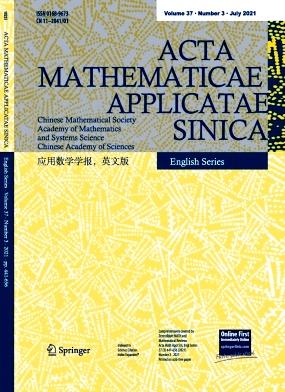一类矩阵方程的最小残差梯度迭代法
IF 0.9
4区 数学
Q3 MATHEMATICS, APPLIED
Acta Mathematicae Applicatae Sinica, English Series
Pub Date : 2023-11-30
DOI:10.1007/s10255-024-1100-0
引用次数: 0
摘要
本文提出了一种基于最小残差的梯度迭代法,用于求解一类矩阵方程,包括Sylvester矩阵方程和一般耦合矩阵方程。迭代法以负梯度为最陡方向,寻求最优步长,使下一次迭代的残差范数最小。证明了迭代序列无条件收敛于任意初始猜想的精确解,残差矩阵和误差矩阵的范数单调减小。通过数值试验验证了该方法的有效性和理论结果。本文章由计算机程序翻译,如有差异,请以英文原文为准。
A Minimum Residual Based Gradient Iterative Method for a Class of Matrix Equations
In this paper, we present a minimum residual based gradient iterative method for solving a class of matrix equations including Sylvester matrix equations and general coupled matrix equations. The iterative method uses a negative gradient as steepest direction and seeks for an optimal step size to minimize the residual norm of next iterate. It is shown that the iterative sequence converges unconditionally to the exact solution for any initial guess and that the norm of the residual matrix and error matrix decrease monotonically. Numerical tests are presented to show the efficiency of the proposed method and confirm the theoretical results.
求助全文
通过发布文献求助,成功后即可免费获取论文全文。
去求助
来源期刊
CiteScore
1.30
自引率
0.00%
发文量
70
审稿时长
3.0 months
期刊介绍:
Acta Mathematicae Applicatae Sinica (English Series) is a quarterly journal established by the Chinese Mathematical Society. The journal publishes high quality research papers from all branches of applied mathematics, and particularly welcomes those from partial differential equations, computational mathematics, applied probability, mathematical finance, statistics, dynamical systems, optimization and management science.

 求助内容:
求助内容: 应助结果提醒方式:
应助结果提醒方式:


